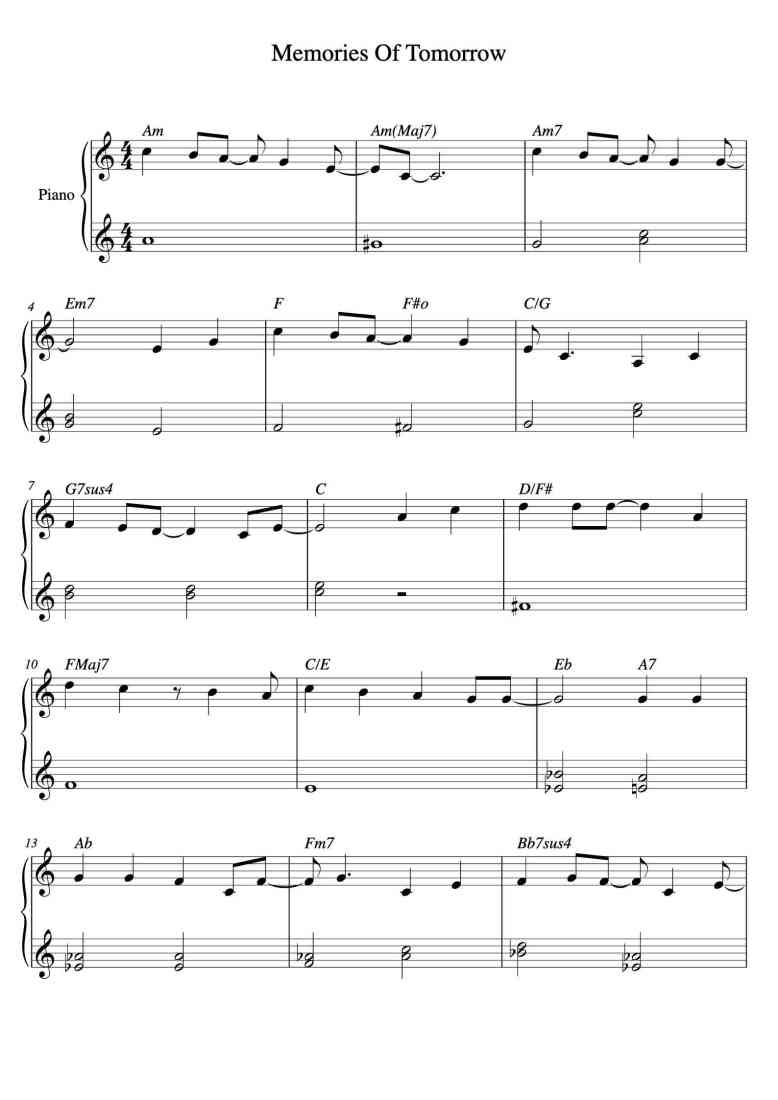00:00/00:00
Tomorrow - Charles Strouse
Free Sheet music for Piano
The resources on this platform are uploaded by users. If you believe your intellectual property rights have been infringed upon, please contact us promptly. Email: copyright@openscorevault.com
About this product
Tomorrow, by Charles Strouse
Difficulty Analysis
Several challenging technical aspects emerge within the score that require specific focus during practice:
- Hand Coordination:
The interplay between the right and left hands presents challenges, particularly in measures 35-40. The right hand’s melodic flourishes must be cleanly articulated while maintaining the left hand's rhythmic support.
- Finger Dexterity:
Rapid passages, specifically in measures 60-65, demand nimble finger movement due to the sequence of sixteenth notes.
- Dynamics and Expression:
Achieving the dynamic contrast required in measures 70-75 poses a potential hurdle as the performer must navigate from soft and gentle phrases to powerful climaxes without losing control.
Solutions:
To address these challenges, consider the following:
Practice Tips
- Dynamic Markings: Regularly refer to dynamic indications in the score during practice to instill expressive play.
Focus Areas:
To overcome performance difficulties:
- Sectional Rehearsal:
Break the piece into smaller sections. Concentrate initially on measures 1-15 to establish a solid melodic foundation, after which build towards integrating measures 40-50 where the rhythm shifts.
- Targeted Exercises:
Create targeted exercises, like arpeggio drills, to enhance finger strength and dexterity. For instance, measures 60-65 can be simplified to focus solely on the right hand's sixteenth-note patterns.
- Metronome Use:
Regularly practice with a metronome, starting slow and gradually increasing the tempo. This technique is particularly effective for rhythmically complex sections around measures 20-30.
- Recording Yourself:
Record practice sessions to identify areas needing improvement, especially dynamics and tempo consistency.
Music Appreciation
The composition "Tomorrow" is crafted in the key of F Major and employs a 4/4 time signature at a moderate tempo of 80 BPM. The primary melody, which is articulated in the right hand, is complemented by a harmonically rich accompaniment provided by the left hand.
Key Features:
- Structure and Melody:
The piece features a lyrical melody that is predominantly present in the right hand, characterized by ascending and descending patterns as seen in measures 4-6 where the melodic line transitions through notes A4, B♭4, and C5, leading into a beautifully resolved F5.
- Chord Progressions:
The score makes use of common chord progressions within the key, mainly cycling through I (F), IV (B♭), and V (C). For example, in measures 10-12, we observe a classic I-IV-V progression that adds emotional depth.
- Rhythmic Complexity:
The piece embraces various rhythmic patterns, especially in measures 20-30 where we witness syncopation and triplet rhythms, enriching the overall texture. Additionally, the use of tied notes adds a smooth, legato feeling contrasted with staccato phrases, especially noticeable in measure 15.
- Harmonic Functionality:
The harmony shifts subtly but effectively throughout the piece, with temporary modulations that bring a fresh perspective to the melody. For instance, measures 45-50 venture towards A♭ Major, creating a contrasting section that enhances listener engagement.
Quick Details
Tomorrow
- ArtistCharles Strouse
- Number of imitations:301
- GenreCharles Strouse
- KeyF
- Tempo80
- Pages4
- NotationCharles Strouse
- ComposePrufe Pearridge
- IntroductionTomorrow' - Prufe Pearridge, This music is undefined, arr. by Charles Strouse, Suitable for all students to learn
Recommendations




